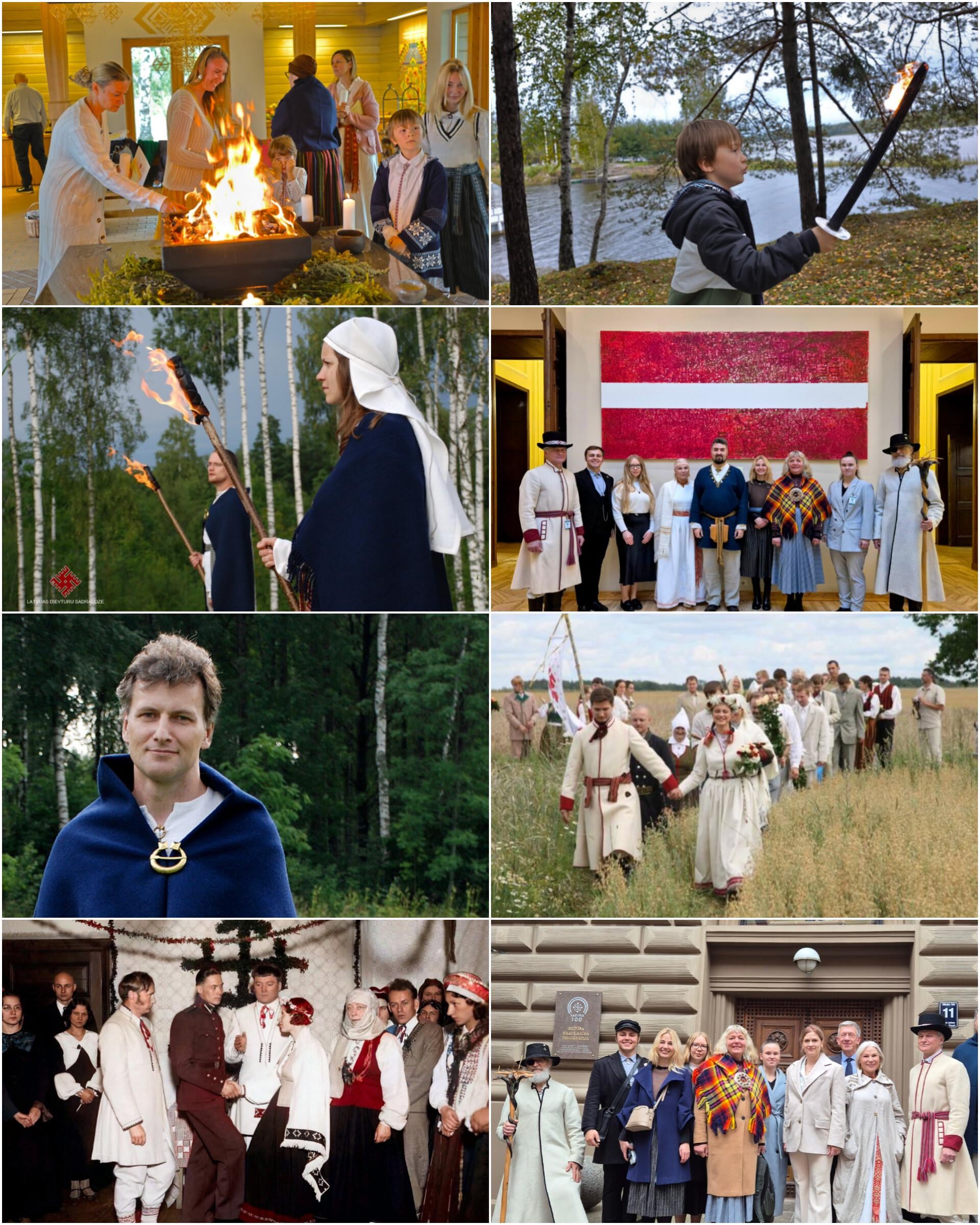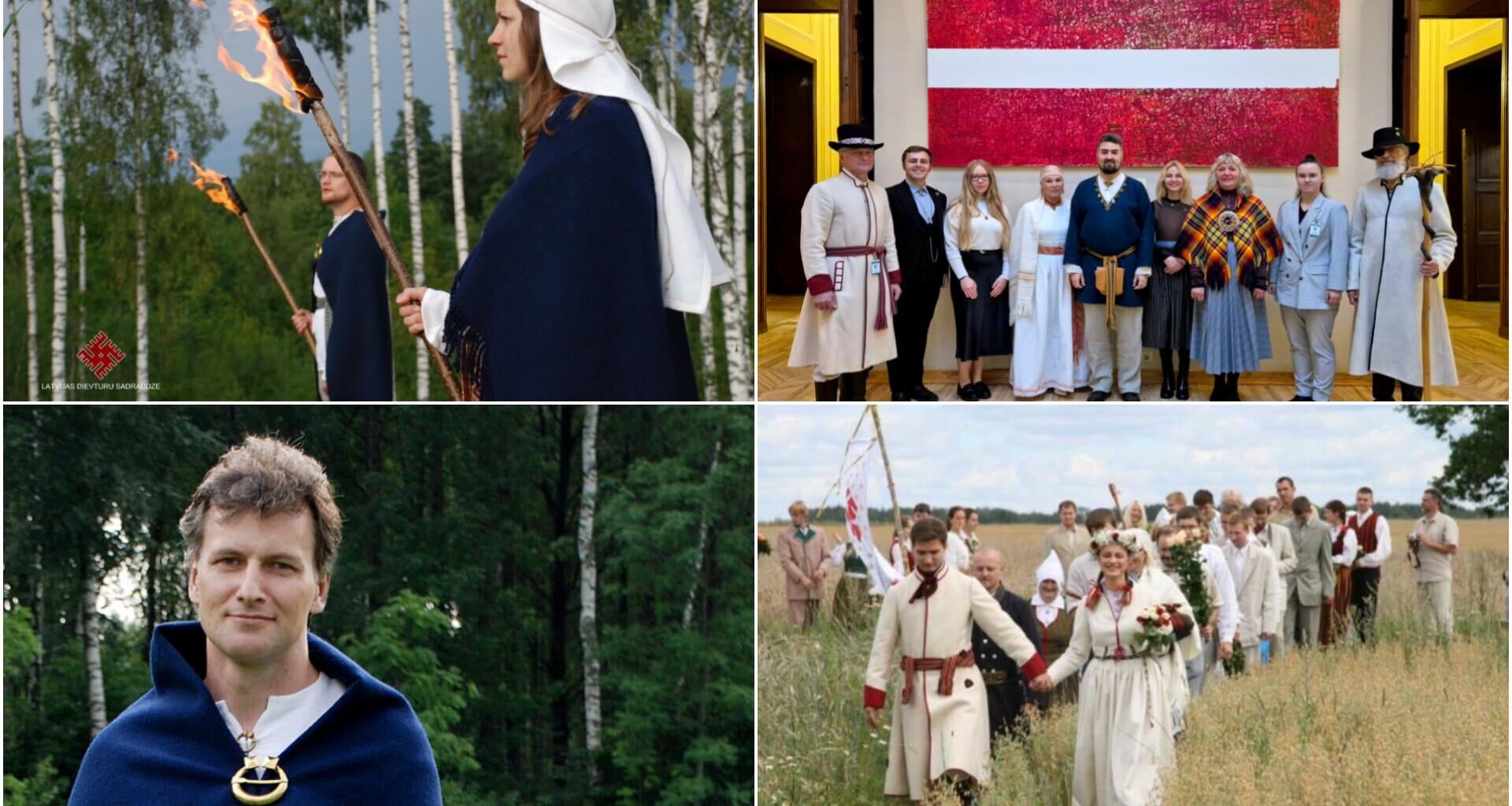
Latvia just granted special status to paganism. The Dievturi Community Law represents the first time a European state has enshrined a place for an autochthonous religion in the state. Dievturi priests may officiate marriages and provide spiritual services in military and educational institutions
https://i.redd.it/y1v0n8dgo1wf1.jpeg
by goldstarflag

34 comments
*Historic Milestone for an Ethnic Religion in the EU: Law Grants Dievturība Status as a Longstanding Traditional Religion in Latvia
Rīga, Latvia — October 9, 2025 — The Parliament of the Republic of Latvia has made history by passing the Law of the Latvijas Dievturu sadraudze (henceforth — Sadraudze) in its third and final reading, with 63 votes in favor, 7 votes against, and 2 abstentions.*
*This is the first law in the European Union to formally recognize an ethnic religious union, explicitly affirming its traditional status: “Dievturība, as a traditional religion in Latvia, and the Sadraudze representing it have maintained a longstanding presence in Latvia; it is faithful to spiritual and moral values, nurtures the Latvian language and traditions, and preserves the nation’s spiritual heritage” (Article 2.2).*
*The law grants the Sadraudze legal status; protects its name, sacred sites, shrines, and ritual objects; and secures the right to self-governance under its statutes (Articles 3–5). Key rights include legal marriage, spiritual care, education, and training. Sadraudze’s authorized priests may officiate marriages under Civil Law (Article 6), and provide spiritual services in military, medical, and correctional institutions (Articles 7–8), and the Sadraudze maintains a publicly accessible official Priests’ Registry submitted to the Ministry of Justice (Article 11). Sadraudze-founded educational institutions may determine curricula and train priests or other personnel for religious service (Article 10).*
*“After eight centuries since the violent Christianization of the Baltic lands began, Latvia — now a member of the European Union, founded on the principle of unity in diversity — finally has the opportunity to return to and continue the ancient religious traditions upheld by the Sadraudze, whose roots have endured through Latvian folk songs and other forms of intangible cultural heritage,” said Andrejs Broks, Grand Leader of the Sadraudze in charge of spiritual affairs.*
*“This law — developed by the Dievturi since 2022, in response to a parliamentarian proposal introduced in 2018 to explicitly define traditional religious groups in Latvia — recognizes Dievturība as a traditional religion deeply rooted in Latvia’s history and culture,” said Dr. Uģis Nastevičs.*
Although some might think that the demise of Roman religion represented the end of state paganism in Europe, it was an event a whole millennium later that truly ended it. On 14 February 1387 Grand Duke Jogaila of Lithuania and a group of Catholic priests extinguished the perpetual fire and closed the temple of the thunder god in Vilnius. State paganism in Europe was over — until, that is, 9 October 2025. So a historic milestone!
Wohoo! Way to go Latvia!
This American tips his hat to the Latvian Republic. Wish we were as progressive. 🫡
Bro, this is so cool. Hope that Serbia does this also in the near future!
Love to see this. I was raised pagan and I didn’t even know Christianity was something people took seriously until I was almost an adult. 😅
EDIT: I’ll elaborate a bit. I knew Christianity was a religion obviously and somewhere in the back of my mind I knew people believed in it, but i always thought that people who prayed before meals and before bed and went to church once a week etc were not real. I saw it in American movies and I thought it was one of those things that was made up by Hollywood for theatrical effect. I distinctly remember being on a bus when I was in high school and there were two girls sitting behind me talking about God. They were talking about the Christian school they go to but despite that they didn’t know anyone else who was religious. And I remember thinking IT’S REAL.
Back to their roots! Fantastic to see.
Cool and all but I think [Romuva paganic religious community was recognized officialy in Lithuania on 12th of December 2024.](https://en.wikipedia.org/wiki/Romuva_(religion)#Independence:~:text=State%20recognition%20was%20granted%20in%202024) So not the first time when a European state recognizes a traditional religion. Though I don’t know anything if Latvia made it on a deeper level than Lithuania did.
Holy based, very cool
Welcome to the “lets just call religions for the cults they are and recognize the whole bunch” club.
In Denmark there are 185 recognized faiths. The only ones not getting officially recognized is atheism. The politicians argue that to be officially recognized as a faith,,,,,,, you need to have one.
https://www.blkm.dk/andre-trossamfund/trossamfundsregistret/liste-over-anerkendte-trossamfund-og-tilknyttede-menigheder
That’s so cool!
Beautiful and unfathomably Based.
This makes me very happy as an Indian living in Europe with a Latvian girlfriend and would like to get married according to the pagan traditions. The rituals seem so similar to hinduism (Specifically from my region in eastern india).
I hope Albanians do that as well one day… My great grandmother used to officiate Albanian pagan rituals in her village but she was the last one to do so and her knowledge now is lost, only my mother has some memories from that time.
I know Lithuania recognized last year Romuva and now Latvia so naturally I had to look up to see if there are any neo paganism movements in Estonia. Apparently there are two, Taarism and Maausk; maybe somebody from Estonia can give us a better look at the status of these two in modern Estonia.
Also, interesting to see the last region of Europe to be Christianised making a return to paganism.
Oh cool, country that celebrates nazi collaborators now celebrates paganism, very cool.
What a bunch of useless larping. “Muh traditions”, who honestly believes in any of this? Are they going to officiate worshipping horoscopes next?
Let’s spread obscurantism throughout Europe. What a great idea.
Every state should be laic, i still get annoyed when the Church tries to enter politics here in Italy ( if you wanna talk, let’s talk about the taxes you are not paying Mr. Cardinal/Bishop/Pope)
If you recognize monotheistic religions there’s no reason not to recognize any other religion.
As long as the citizen abides by the laws who cares what God they belive in?
I do not see that as an issue. Better paganism than some extremist religion.
Dievturība is a 20th-century reconstruction of historic pagan practices. It is neo-pagan and represents a nationalistic effort to locate Latvian identity in a pre-Russian, pre-German context
Paganism was consistently but not widely practiced by people who would have historically spoken or self-identified as Latvian. Paganism was widely practiced by pre-Latvian proto-Baltic speakers who changed over time into what we today call Latvians. To assert that the original religion of Latvians was Paganism is to confuse these timelines or to project Latvian identity onto a pre-Latvian community
I think it’s awesome that Paganism is being recognized as a legitimate faith alongside Christianity and I think it’s cool that so many people identify with and find meaning in Dievturība
But this specific act strikes me as a regressive assertion of historically revisionist nationalism
Nice to see the Dievturiba gaining official status in Latvia ! Imo Baltic old beliefs are fascinating, even though we don’t know everything about them.
Don’t know about Dievturi, but in Lithuania the Romuva is a neo-pagan reconstruction of the pagan religion from the 70s (a larp), recognition of it opens up the gates for more modern religions to get the same recognition.
Surprising to hear we’re the first to do it
Good! The less influence from Abrahamic religions the better.
Soon some sailor at the Mediterranean will hear: “The Great God Pan got better.”
Sad to see Latvia Furthermore rejecting Europe.
Was there an existing minority or are they neo-pegans who took up a modern interpretation of the religion?
Are they more common in right-wing circles? In my country the vast majority of neo-pegans are far right extremist, who don’t believe in modern medicine.
When you think about it Pagan Gods are still popular after all these thousands of years. They might not be worshiped like they use to, but their names are still remembered through pop culture in movies/TV, music, books/comics like Zeus, Thor, Odin, Ra, Osiris, Isis, Hercules, Dionysus, Diana, Artemis etc.. Granted, they are mainly from the Greek/Roman, Viking and Egyptian Pantheons.
Im unfamiliar with the Latvian Pagan Gods, there are so many Slavic Gods spread out through eastern Europe. Is it just this pagan sect and their gods that is recognized under this law?
The EU does more for European traditions than anti-EU movements.
Religion/beliefs should be a purely personal matter, never a government matter, or treated like a business (like Christianity etc are), and properly taxed.
And so The Great Return begins!
Look it’s Church Cosplay.
This is wonderful news.
Comments are closed.